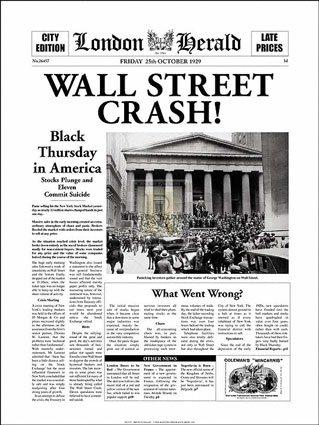On Tuesday 29th October 1929, the American Stock Market, Wall Street, crashed. As a result, 659
crashed in America in 1929, 1352 in 1930 and 2294 in 1931. America recalled loans from Germany that had been negotiated under the
Plan (1924). Germany now had to pay back these loans and had to pay
. For these reasons, the worldwide economic depression that followed the crash affected
particularly badly.

In 1930 there were 3.5 million
in Germany. This rose to 5 million in 1931 and 6 million in 1932. An eyewitness describes the unemployed vagrants in Germany in 1932, 'They completely filled the streets. They stood or lay about in the streets as if they had taken root there'. People were desperate for
, and would have done almost anything to get it. A German worker describes in 1985 why he joined the
in the 1930s. 'I was unemployed for many years. I'd have made a pact with the devil to get work.
came along and got me work, so I followed him'. The unemployed were given food and shelter in
hostels and then became part of the SA.
It was a crisis in Germany. People had lost faith in the
constitution and many people wanted to see a change. It was realised that in such a crisis, the Weimar government needed one strong
to deal with Germany's problems. The Great Depression acted like a catalyst- it reignited people's
for the Treaty of Versailles. People now started listening to Hitler- he seemed to have all the
. The Nazi rallies conveyed a sense of strength and
, which is what people were looking for. Before the Great Depression, people were happy to go along with Stresemann's policy of fulfilment. Support for Hitler grew as unemployment grew. In 1928, the Nazis had 12 seats in the Reichstag. In 1930 this rose to 107 and in 1932 to almost 200. The Nazi party was now the
party. In the 1932 presidency election, Hitler got 13 million votes to Hindenburg's 19 million. Von Papen and Hindenburg realised that a strong man who was backed with popularity in the Reichstag was needed in such a crisis, which is why they eventually appointed Hitler
.
Without the Great Depression, it is unlikely that Hitler would have risen into power. This unexpected event which Hitler had no control over was one of the most
reasons why he became chancellor.